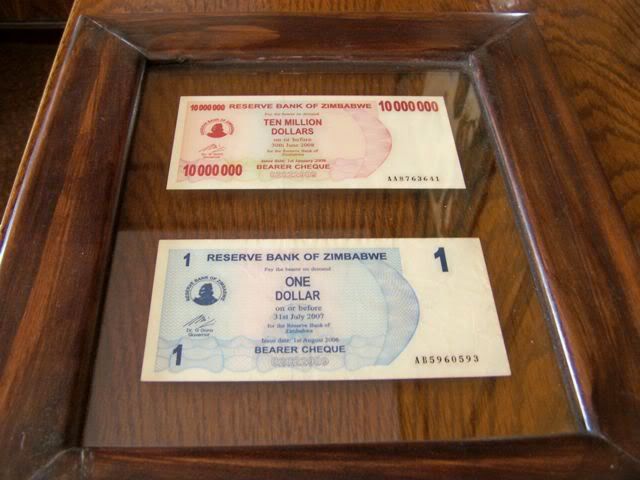06 March 2008, 20:02
Bill Cquote:
The Associated PressPublished: March 5, 2008
HARARE, Zimbabwe: The Zimbabwe currency tumbled to a record low of 25 million for a single U.S. dollar Wednesday, currency dealers said.
With Zimbabwe dollars mostly available in bundles of 100,000 and 200,000 notes, one US$100 note bought nearly 20 kilograms (40 pounds) of local notes at the new market rate Wednesday.
And this is excluding the zero's that were dropped!
14 March 2008, 03:23
Bill CLooks like you are going to have one heck of a collection until its all said and done!

And at the current 41 million to 1 USD, these bills are worth way more as collector items then currency. And actually, they are pretty good looking.
The $1000 Bearer Check from Aug 2006 is selling for $7.00 on
www.banknotes.com - 142:1, aw the good old days!

Gray Ghost Hunting Safaris
http://grayghostsafaris.com Phone: 615-860-4333
Email: hunts@grayghostsafaris.com
NRA Benefactor
DSC Professional Member
SCI Member
RMEF Life Member
NWTF Guardian Life Sponsor
NAHC Life Member
Rowland Ward - SCI Scorer
Took the wife the Eastern Cape for her first hunt:
http://forums.accuratereloadin...6321043/m/6881000262Hunting in the Stormberg, Winterberg and Hankey Mountains of the Eastern Cape 2018
http://forums.accuratereloadin...6321043/m/4801073142Hunting the Eastern Cape, RSA May 22nd - June 15th 2007
http://forums.accuratereloadin...=810104007#810104007 16 Days in Zimbabwe: Leopard, plains game, fowl and more:
http://forums.accuratereloadin...=212108409#212108409Natal: Rhino, Croc, Nyala, Bushbuck and more
http://forums.accuratereloadin...6321043/m/6341092311 Recent hunt in the Eastern Cape, August 2010: Pics added
http://forums.accuratereloadin...261039941#926103994110 days in the Stormberg Mountains
http://forums.accuratereloadin...6321043/m/7781081322Back in the Stormberg Mountains with friends: May-June 2017
http://forums.accuratereloadin...6321043/m/6001078232"Peace is that brief glorious moment in history when everybody stands around reloading" - Thomas Jefferson
Every morning the Zebra wakes up knowing it must outrun the fastest Lion if it wants to stay alive. Every morning the Lion wakes up knowing it must outrun the slowest Zebra or it will starve. It makes no difference if you are a Zebra or a Lion; when the Sun comes up in Africa, you must wake up running......
"If you're being chased by a Lion, you don't have to be faster than the Lion, you just have to be faster than the person next to you."
14 March 2008, 10:21
billrquimbySure, there are shortages of the big bills but I still don't know why someone doesn't sell Zim money at the hunting shows.
I'd pay $20US for Don's Zim$10,000,000 note (reported above as officially worth $0.40US in Zimbabwe at 25,000,000 to 1), for example, and I'm widely known for being a cheapskate.

Is it illegal under Zimbabwe or U.S. law?
Bill Quimby
14 March 2008, 12:54
Ganyanaexchange rate to the US$ today is
Official 30.000:1
Cash for cash 27, 000,000:1
Transfer 40,000,000:1
New legislation makes it an offence to have more than 500 mill zim cash on you at any one time- ie US$12.50!!!
The reason for the disparity between the cash and transfer rate is because of the shortage of local cash.
17 March 2008, 17:54
mouse93Business Day
14 March 2008
Evan Pickworth
I-Net Bridge
AS ZIMBABWE faces up to the pain and ridicule of cumulative hyperinflation
of 3,5-million percent since 1998, a leading world economist, Steve Hanke,
suggests a rather controversial solution: get rid of their central bank.
Hanke, a previous economic adviser to Ronald Reagan and now professor of
applied economics at the prestigious Johns Hopkins Uni-versity, has
published a report, Zimbabwe: Hyperinflation to growth, in which he explains
his observations and solutions to the mess.
He draws parallels between the Zimbabwean hyperinflation and the plot
followed by the German mark during the great German hyperinflation of the
1920s. This leads him to say that "worse is yet to come".
He says the root cause of hyperinflation is that government policies have
forced the Reserve Bank of Zimbabwe (RBZ), headed by Gideon Gono, to print
money.
"From January 2005 to May 2007, the RBZ issued currency at a rate that even
exceeded that of Germany's central bank from January 1921 to May 1923, the
ramp-up phase of the great German hyperinflation," he said.
He says that replacing the central bank with a new monetary regime is
therefore the best way to stop hyperinflation as it signals a "clean break"
with the practices that have created hyperinflation.
"It would give Zimbabweans reliable assurances that inflation will
henceforth be controlled."
Hanke acknowledges that while countries such as Angola and Mozambique have
checked inflation in the hundreds of thousands of percent a year by changing
policies and yet retaining central banks, he feels it is far too late in the
day for Zimbabwe.
"Given the current state of affairs in Zimbabwe and the dramatic
hyperinflation, the only way for Zimbabwe to make a credible commitment to
stop the hyperinflation rapidly and avoid high transition costs is to
replace central banking with a different type of monetary regime."
Three options exist: official "dollarisation", adopt free banking; and
introduce a currency board.
"None of these options requires preconditions prior to their implementation
and any one of them would establish stability and restore economic growth,"
Hanke says.
He points out that Panama, Ecuador and El Salvador are no less sovereign
after adopting the dollar.
"Estonia, Lithuania, Bulgaria and Bosnia and Herzegovina are no less
sovereign for having currency board or currency board-like systems."
Consider also Montenegro. "It became an independent sovereign state in 2006
largely because it replaced the Yugoslav dinar with the German mark (now
euro) in 1999.
"Using the euro enabled Montenegro to break loose from the bad economic
policies undertaken at the time by Serbia, its much larger partner in the
Federal Republic of Yugoslavia.
"The effect of dollar-isation or a currency board is not to create a
colonial relationship, but to achieve more credibility than a local central
bank can," he says. In Zimbabwe, official dollarisation could take the form
of using the rand, US dollar or the euro.
"If Zimbabwe uses the rand it could negotiate a profit-sharing agreement
such as Lesotho and Namibia now have." SA shares the profit it derives from
issuing currency according to estimates of how many rand notes and coins are
in circulation in the partner country.






